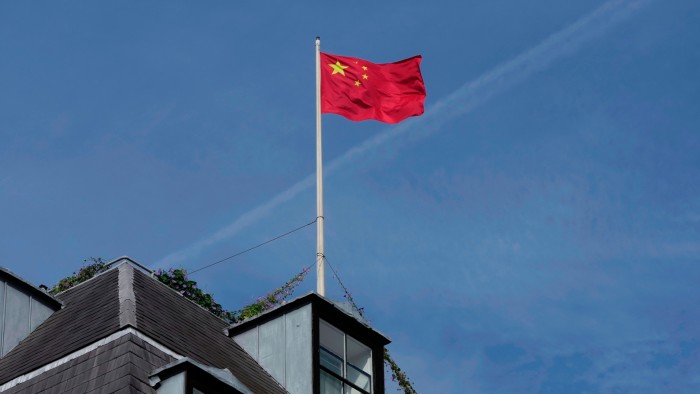Unlock the Editor’s Digest for free
Roula Khalaf, Editor of the FT, selects her favourite stories in this weekly newsletter.
China’s embassy in London has warned the UK to “stop creating trouble” as it hit out at MPs’ “twisted mentality” over allegations that a Chinese businessman linked to Prince Andrew is a Communist party spy.
An embassy spokesperson also accused UK lawmakers of “arrogance and shamelessness” over the claims.
The spokesperson added: “We urge the UK side to immediately stop creating trouble, stop anti-China political manipulations, and stop undermining normal personnel exchange between China and the US.”
Tuesday’s comments came after a judge allowed the 50-year-old Chinese national, who has been banned from Britain on national security grounds, to be identified as Tengbo Yang.
Dan Jarvis, UK security minister, welcomed the court’s decision to uphold the ban on Yang and warned that “this case does not exist in a vacuum”.
He told MPs that Britain faced “ongoing efforts by a number of states, including China, Russia and Iran, to harm the UK’s security”.
Yang’s anonymity order was reviewed during a hearing at the Royal Courts of Justice on Monday, as MPs were threatening to use parliamentary privilege to name Yang in the House of Commons.
On Tuesday, the Chinese spokesperson labelled “the anti-China clamours made by a handful of UK MPs” as a bid “to smear China [and] target against the Chinese community in the UK”.
“We strongly condemn this,” the spokesperson added.
Separately on Tuesday, a lawyer whom MI5 accused of “political interference” on behalf of the Chinese Community party lost a key legal challenge against the security services.
Christine Lee, who set up an all-party parliamentary group “Chinese in Britain” and donated more than £420,000 to Labour MP Barry Gardiner, was the subject “interference alert” in 2022 that acts as a warning to anyone engaging with her.
Interference is separate to espionage, which involves collecting information.

Lee’s lawyers had argued to the Investigatory Powers Tribunal, a body that oversees the UK’s security services, that the alert made to parliament was unlawful and politically motivated.
Lord Justice Singh dismissed the case, saying the risk posed by Lee had been “rationally assessed” by MI5 in line with its remit, and the alert was intended to be “preventive”.
He added there had not been an “authoritative finding” that Lee had been engaged in criminal activity or other misconduct.
The tensions mark a potential setback for the Labour government’s bid to improve ties with Beijing. Prime Minister Sir Keir Starmer met President Xi Jinping last month, in the first meeting between the countries’ leaders since 2018, promising to build “consistent, durable, respectful” relations.
Yang had developed business links to Prince Andrew and access to a network of other senior British political and business figures. He was also photographed with former Conservative prime ministers Lord David Cameron and Baroness Theresa May.

MI5 had alleged that Yang was a member of the Chinese Communist party working for the United Front Work Department, which gathers intelligence. The case against him was premised in part on data unearthed from his phone, which was seized by the UK security services in November 2021.
On Tuesday, the Chinese embassy spokesperson said the United Front was “above board and beyond reproach”, characterising it as an attempt to promote co-operation between the Chinese Communist party “and people who are not members of it and promote people-to-people exchanges and friendship with other countries”.
Yang had challenged the ban from the Home Office, an appeal that was rejected last week by the Special Immigration Appeals Commission, and on Monday he hit out at his treatment. “The widespread description of me as a ‘spy’ is entirely untrue,” he said.
“The political climate has changed and unfortunately I have fallen victim to this,” he added. “When relations are good and Chinese investment is sought, I am welcome in the UK. When relations sour, an anti-China stance is taken, and I am excluded.”
The commission’s ruling found that Yang “had been in a position to generate relationships with prominent UK figures and senior Chinese officials that could be leveraged for political interference purposes by the CCP [Chinese Communist party] . . . or the Chinese state”.
